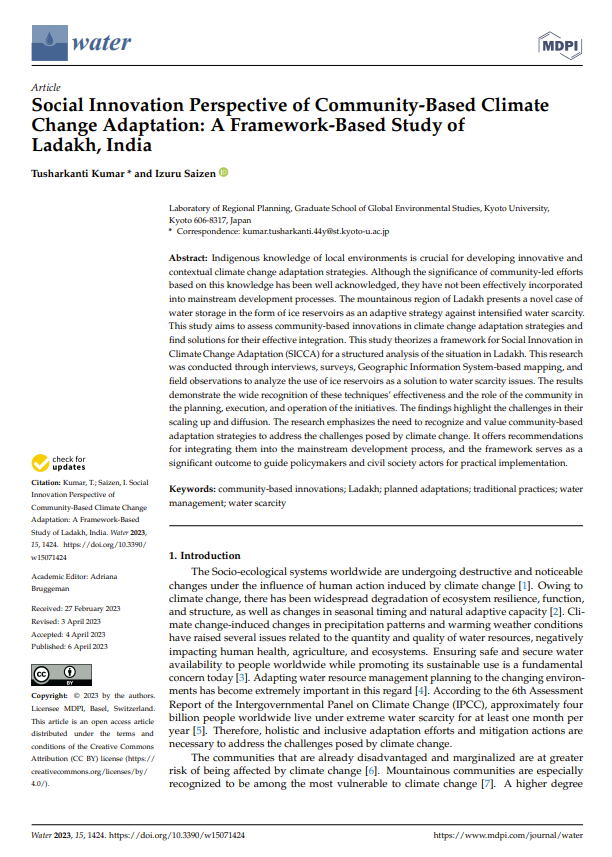This blog post is part of the series What to Read. This issue has been developed in the frame of a project in collaboration with ANGOC, ALRD and funded by the Global Forum on Agricultural Research (GFAR).
Climate change adaptation has become a hot topic of debate. There is a certain urgency when we think about climate change-related natural disasters and how communities worldwide can protect themselves and design solutions.
Donors and international organizations, such as the International Monetary Fund or World Vision, will oftentimes frame community responses as “innovation”. However, the emphasis on the innovative character of climate change adaptation falls short of addressing the challenges that communities face. Instead, with disasters increasing worldwide, it becomes urgent to understand and acknowledge how communities around the world are impacted by extreme natural hazards such as floods, storms, drought, or wildfires.
With this in mind, what is needed is not only livelihood analysis, but a better understanding of what contributes to strengthening local resilience - and here, the role of local knowledge is crucial.
Often overlooked, the rural poor are highly vulnerable and affected by climate change-induced natural disasters. There are two reasons. First, due to high levels of land tenure insecurity in this group, natural disasters often result in land loss and migration, and families have little means to reclaim their land or property without records or formal registration documents. Secondly, insecure land rights provide little incentives or capacities to mitigate or adapt to the effects of climate change.
This latter point was emphasized in the latest report of the Intergovernmental Panel on Climate Change (IPCC) “Climate Change and Land”. People are less likely to plant trees or protect the forest if they fear that their land could be taken at any time.
In this What to Read digest, I share with you some reflections on four recent articles that focus on how rural communities in the Global South are dealing with climate events, including cases from Bangladesh, Colombia, and India. The first two articles emphasize the role of local knowledge for sustainable adaptation. The third paper discusses the underexplored issue of tenure (in)security in the context of climate change in a post-conflict environment. The last research piece closes with a refreshing take on deconstructing fears of climate-led (mass) migration.
Sign up here to receive this digest in your mailbox
Publications reviewed in this issue:
- Social Innovation Perspective of Community-Based Climate Change Adaptation: A Framework-Based Study of Ladakh, India
- Land Tenure Insecurity and Climate Adaptation: Socio-Environmental Realities in Colombia and Implications for Integrated Environmental Rights and Participatory Policy
- Climate mobilities: Migration, im/mobilities and mobility regimes in a changing climate
Adopting the Local Knowledge of Coastal Communities for Climate Change Adaptation: A Case Study From Bangladesh
By Nahid Sultana and Johannes M. Luetz, 2022

This piece offers a community-driven and practice-oriented approach with the aim of identifying local grassroots perspectives, contrasting these with the national climate change adaptation frameworks. The authors take a closer look at adaptation initiatives including autonomous responses from villages to adverse effects of climate change as well as coordinated programs that aim to reduce climate stress vulnerabilities.
Drawing on interviews and surveys with farmers, fishers, women, businessmen, and local leaders conducted in four coastal villages, the paper explores the value of coastal community engagement in Bangladesh. With its strong focus on strategic policy, the paper speaks to both academics and practitioners. Although it leaves many questions unanswered, this study acts as a missing link between local and national level entities in dealing with climate change.
By contrasting two coastal districts, Sultana and Luetz present four main findings. First, the authors found that Indigenous and local knowledge is not considered in decision-making processes related to climate change adaptation in any of the villages because most of it has been lost in recent years.
Second, they see an overlap in adaptation measures identified and prioritized by community members in both coastal districts and the components of the major national frameworks, including the Integrated Coastal Zone Management and the National Adaptation Programme of Action. According to the paper, the bigger challenge lies with the timely implementation of respective measures.
Third, the study finds that the communities’ main concerns in the context of climate stress and adaptation options lie with insufficient water management, improvement of socio-economic conditions, and inland migration.
Fourth, the paper emphasizes that relevant information needs to be made available to coastal communities in a more accessible way. Concluding, Sultana and Luetz call for a better prioritization of adaptation measures that are suitable to local contexts and integrate Indigenous and local knowledge.
Social Innovation Perspective of Community-Based Climate Change Adaptation: A Framework-Based Study of Ladakh, India
By Tusharkanti Kumar and Izuru Saizen, 2023

This contribution highlights the relevance of indigenous knowledge in developing innovative and context-specific responses to climate change. The paper discusses the link between Indigenous knowledge and social innovation by drawing on the case of Ladakh, India, a high-altitude area that faces water scarcity and storage problems.
The qualitative study uses an ethnographic approach, ranging from expert interviews to observation and semi-structured surveys in upstream and downstream villages, conducted over multiple field visits in 2021/22. Residents and local stakeholders were asked about traditional irrigation management and livelihood practices under consideration of recent socioeconomic changes and changing weather patterns. In utilizing the concept of social innovation, the paper moreover draws attention to the collaborative and inclusive as well as capacity building dimensions of community-based innovations.
According to the study the major community-based innovative measures include stream blocking, snow fencing walls, and artificial glaciers. What is more, and often overlooked in discussions of integrating local adaptation measures, the authors outline challenges of scaling and diffusion. Although many artificial glacier projects seem to be effective, they lack formal recognition which is a major constraint in scaling up efforts. It would have been interesting to gain more insights into diffusion challenges in other glacier regions.
Concluding, the authors demand to effectively integrate community-led measures into mainstream development plans and frameworks. The developed framework may help practitioners guide these processes.
Land Tenure Insecurity and Climate Adaptation: Socio-Environmental Realities in Colombia and Implications for Integrated Environmental Rights and Participatory Policy
By Brianna Castro and Christina Kuntz, 2022

This original analysis explores the interlinkages between land tenure security and the resilience and adaptive capacity of households facing climate change. In addition to long years of displacement and conflict, the research area in Colombia has experienced severe droughts, extreme heat, and the salinization of groundwater over the last decade.
First, the authors show how secure land rights or the lack thereof have determined families’ options to adapt to shifting environmental conditions since 2013. Second, they argue that climate stress in turn compounds existing tenure insecurity.
Although the latter remains relatively underexplored in the paper, Castro and Kuntz provide nuanced insights into the decision-making of households with land titles and families who had filed for land restitution facing complex post-conflict tenure policies. Initially, both groups started adapting to drought by adjusting their planting plans in 2013. This was followed by planting less crops in quantity and variety.
In 2015, after yet more failed harvests, families with secure land rights decided to migrate to other agricultural areas or cities to make a living. However, landless families who were waiting for the land restitution process - which would only begin after the Peace Agreement was signed in 2016 – feared they would lose their claims if they left the land. As a result, they depleted all their financial and social resources and thus adding more pressure to any future livelihood plans.
Against this backdrop, the authors call for sustainable development policies that take jointly into account land tenure and climate change, and incorporate citizen participation to allow for local-level autonomous climate adaptation.
Climate mobilities: Migration, im/mobilities and mobility regimes in a changing climate
By Ingrid Boas, Hanne Wiegel, Carol Farbotko, Jeroen Warner and Mimi Sheller, 2022
 This timely publication serves as an introduction to a special issue offering an analytical perspective on the plurality and politics of human movement in the context of climate change. It discusses the different faces of mobility in the context of climate stress, including mobile flows and the mobility of ideas, information, or climate risks. Furthermore, the authors shed light on the politics of climate mobilities, mobility regimes, and consequences for mobility justice. Notably, the paper calls for more research on resistance against mobility regimes, such as voluntary immobilities that question imposed relocation policies.
This timely publication serves as an introduction to a special issue offering an analytical perspective on the plurality and politics of human movement in the context of climate change. It discusses the different faces of mobility in the context of climate stress, including mobile flows and the mobility of ideas, information, or climate risks. Furthermore, the authors shed light on the politics of climate mobilities, mobility regimes, and consequences for mobility justice. Notably, the paper calls for more research on resistance against mobility regimes, such as voluntary immobilities that question imposed relocation policies.
In addition to introducing the articles, the editors present three main arguments. First, in order to address questions of power and politics the authors demonstrate the relational character of climate mobilities and attempt to understand how these are framed and governed. In doing so, it is necessary to examine what normalizes, enhances, or challenges climate mobilities and in which ways these are stigmatized or exploited.
Second, the paper stresses the importance of the power of representation. As climate change concerns the future in many ways, its governance is about anticipation. For example, more powerful stakeholders, such as donors, can promote strategies that lead to the dispossession of groups that are less influential in the discourse about their climate future or further marginalized by current discourses on climate adaptation.
Third, the authors draw attention to the fact that climate mobility regimes can be contested, circumvented, or renegotiated from below. This argument is key in opening the discussion on “climate refugee” storylines and renegotiating perspectives of settlement as a norm.


